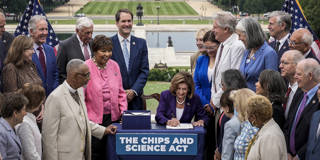Recent scholarship has done much to reopen the case in favor of selective government intervention to promote specific industries in particular places. But the success or failure of industrial policies has never been a purely economic issue.
MARRAKESH – Industrial policy is back. It is back with a vengeance in the United States, where for decades the dominant ideology and policy minimized government efforts to influence the structure of the economy. Now, in contrast, we have the Infrastructure Investment and Jobs Act, the CHIPS and Science Act, and the Inflation Reduction Act, all with significant industrial-policy components.
And what happens in the US doesn’t stay in the US. Other countries, similarly seeking to preserve and enhance their industrial bases, have responded with comparable measures. The question is whether the return of such government-led efforts should be welcomed.
Industrial policy has a long history, extending back to Alexander Hamilton, America’s first Treasury secretary, and his Report on Manufactures (1791), if not even further back to Jean-Baptiste Colbert, first minister under King Louis XIV in the 1660s. By the end of the twentieth century, however, industrial policy had fallen out of favor. Simple models of the market economy provided no rationale for selective government intervention to promote specific industries in particular places.

MARRAKESH – Industrial policy is back. It is back with a vengeance in the United States, where for decades the dominant ideology and policy minimized government efforts to influence the structure of the economy. Now, in contrast, we have the Infrastructure Investment and Jobs Act, the CHIPS and Science Act, and the Inflation Reduction Act, all with significant industrial-policy components.
And what happens in the US doesn’t stay in the US. Other countries, similarly seeking to preserve and enhance their industrial bases, have responded with comparable measures. The question is whether the return of such government-led efforts should be welcomed.
Industrial policy has a long history, extending back to Alexander Hamilton, America’s first Treasury secretary, and his Report on Manufactures (1791), if not even further back to Jean-Baptiste Colbert, first minister under King Louis XIV in the 1660s. By the end of the twentieth century, however, industrial policy had fallen out of favor. Simple models of the market economy provided no rationale for selective government intervention to promote specific industries in particular places.